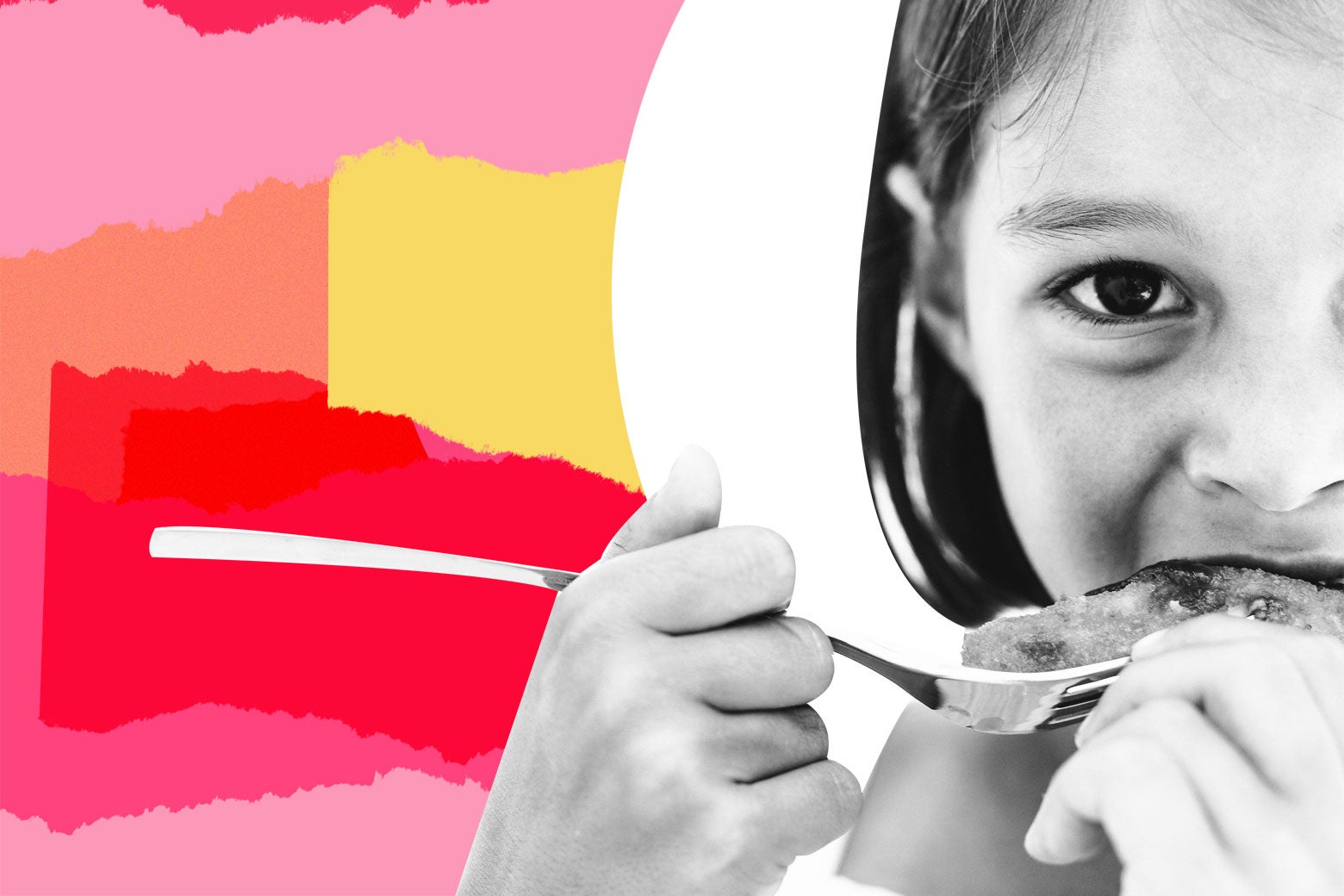Slate Plus members get more Care and Feeding from Carvell Wallace every week.
Dear Care and Feeding,
My partner and I have two kids—a 6-year-old daughter and a 4-year-old son. Our son is the typical little-kid picky eater—he’d prefer to subsist on peanut butter, pasta, french fries, and fruit. There are plenty of times he flat out refuses to eat all or part of his meal and then grazes later.
Our daughter has always been an adventurous and enthusiastic eater. But she is also “food focused”—she seems hyperaware of what other people are eating, and a meal or a snack always sounds good to her, whether or not she’s actually hungry.
Due to their dissimilar eating preferences, our daughter’s plate often looks different than our son’s. We rarely cook completely separate meals, but after a full day of work and school, I just want everyone to eat something, so there are usually some substitutions or differing portion sizes, which our daughter sometimes finds unfair. Our son is also apt to eat a smaller meal and then request more food later. We are fine with him grazing on healthy foods, but our daughter will immediately request the same snack even though she ate a much larger meal and most likely is not truly hungry.
I’m struggling to manage these differing eating styles while also trying to promote healthy eating habits—especially in regard to our daughter. Food always sounds good to me too, and recognizing when I’m truly hungry is a lesson I’m still learning. While I was never overweight as a child, my own mother always monitored and controlled what I ate. I struggled with anorexia and bulimia as a teenager and young adult, and continue to struggle with body image now.
So I’m hyperaware of how we interact with my daughter around meals and snacks. My partner has no trouble telling her she doesn’t need a snack 30 minutes after she’s eaten a full meal while handing over a yogurt tube to our son because his dinner portion was much smaller. I’m constantly afraid she will interpret this as “my parents think I eat too much” or “my parents prefer my brother,” and we will all wind up in family therapy for a raging eating disorder. But I also do agree we need to help her learn the difference between true hunger and mindless or emotional eating.
How would y’all handle this? Am I overthinking this due to my own food history? (My partner thinks so!) If it matters, both of our kids are very active, and neither is under- or overweight.
—Food Cop
Dear FC,
Thank you for writing in about this and I’m happy to hear that you are in a healthy place with your eating. These things are complex, painful, and very difficult to manage, so kudos to you for wanting to face them head on.
That said, I’m amazed at how frequently I hear some variation of “I’m afraid this behavior of mine will give my kid an eating disorder” in letters and comments from parents. I mean, I get it, because eating disorders are terrible, and we don’t want our kids to have them, especially if we ourselves struggle with them. But I feel pretty sure that the only thing that is 100 percent guaranteed to create disordered eating in kids is parental obsession around food. So you cannot obsess your kid out of an eating disorder.
You do not need to micromanage your daughter’s eating habits. She wants to eat because she wants to eat. That’s OK. It’s even OK if she eats a snack when she’s not hungry. This is neither the end of the world nor proof that she’s on an irreversible path toward compulsive overeating. You can certainly explain the difference between eating because of hunger and eating because of boredom or emotion. But I don’t think it’s wise to consider yourself entirely qualified to tell her what she’s feeling at every moment. To do so would require you to constantly police her thoughts and feelings and I’m pretty sure that’s overkill.
What you can do is be honest with her, slowly, in appropriate moments, and over time, about your own personal experiences with food and disordered eating. Indeed, this is the only thing you know for sure, so it really is the only thing you can talk about with certainty. These conversations are ongoing and entirely crucial. You can think of it like you are planting seeds. You are giving her ways to think about eating that may come in handy when she is actually ready to think about eating. But the thing is right now she’s not, and I suggest you let it stay that way as long as it wants to.
If you are having difficulty with the differing rules for who can eat when and who can’t (and who wouldn’t, that’s a really hard thing to enforce reasonably), I might suggest the following: make the same meals for both kids. Include some junky stuff for brother that he may like and some real food for sister that she may like. Either way let them both know that that’s what they’re getting, and they can either eat it or not eat it. Set rules around snacks that are the same for both kids (last snacks are at 8 p.m. or whatever). Or, if you like, let the kids snack whenever they want. Both approaches are fine, but by setting up different standards, you may be creating an entirely new set of problems that you don’t need.
Assume for the moment that your daughter is fine. Love her and be honest with her. Be much kinder and less judgy than your own mom was with you, and, most importantly, make sure she knows that you are someone she can be authentic with, not someone she has to avoid because you attack her with your own issues. Good luck.
